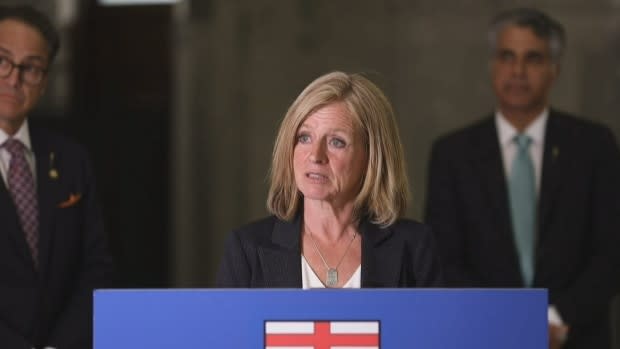Death threats aimed at Dr. Bonnie Henry mirror contempt faced by female leaders, experts say
The revelation that B.C.'s provincial health officer has received death threats comes as no surprise to some women leaders who say this kind of abuse is a widespread problem.
Dr. Bonnie Henry has been praised for her "kind, calm and safe" approach to managing B.C.'s COVID-19 response, but on Tuesday, she said she's faced attacks behind the scenes, ranging from critique of her shoes to her public health orders.
"I've had to have security in my house. I've had death threats. How do we deal with that?'' she said during a panel presentation at the Union of B.C. Municipalities.
"I sense that people find that it's OK for a woman who is upfront, more so than some of our male leaders. But I could be wrong — maybe it is that we just don't talk about it."
'It's something we have seen over and over again'
It's an experience many women can relate to, said Andrea Gunraj, vice-president of engagement at the Canadian Women's Foundation.
"It's something we have seen over and over again, women in leadership positions being targeted because of their gender with sexist behaviour and comments," she said.
"I think it's a cultural issue as much as it is us also not respecting women in leadership positions the way that we should."
Gunraj believes this behaviour is an extension of the ways women are treated differently at every level in society, from the wage gap to a lack of gender parity in politics.
Sussanne Skidmore, secretary treasurer of the B.C. Federation of Labour, said she faced attacks when she was running for public office.
"Comments on my body size, on my sexuality, the makeup of my family, the clothes I'm wearing ... as opposed to my policies and what I'm bringing to the table as a leader," she said.
"We don't hear or see those types of commentary or negative impact in the same way on men. We just don't."
High-profile men also face threats, but experts say those generally focus on their work rather than gender.
Janni Aragon, a political science instructor at the University of Victoria, says research shows different adjectives are used to describe female leaders compared to male counterparts. While a man might be described as strong, a woman might be described as bossy or aggressive, she said.
The veil of anonymity offered on social media can make it easier for someone to bully women leaders they might not agree with, she added.

Skidmore says former premier and current Alberta NDP Leader Rachel Notley is a prime example.
Notley received at least 11 death threats in the first three years of her government's mandate. In 2015, her social media team posted guidelines on her Facebook page advising people how to conduct themselves in the comments section.
Requirements included restrictions on violent speech and pornographic language, something Melanee Thomas, a University of Calgary professor, said she didn't believe any other Canadian premier had to do.
'I should just be respected because I'm a human being'
These factors create added barriers that can deter women from pursuing leadership roles, Gunraj said. It will take structural change in the way society perceives women, their roles as leaders and their leadership styles for gendered attacks to stop, she said.
"That's the harder conversation to have. It takes longer, it takes investment, and it takes us really re-evaluating why we're here and what we do, and why we do things the way we do them," she said.
Skidmore believes the changes need to start with men.
"Men have to say to other men, 'It's not ok to say that about any woman.' They need to make a difference," Skidmore said.
"It's not because we're sisters, or somebody's mom ... I should just be respected because I'm a human being, period. And it shouldn't have anything to do with my gender."

